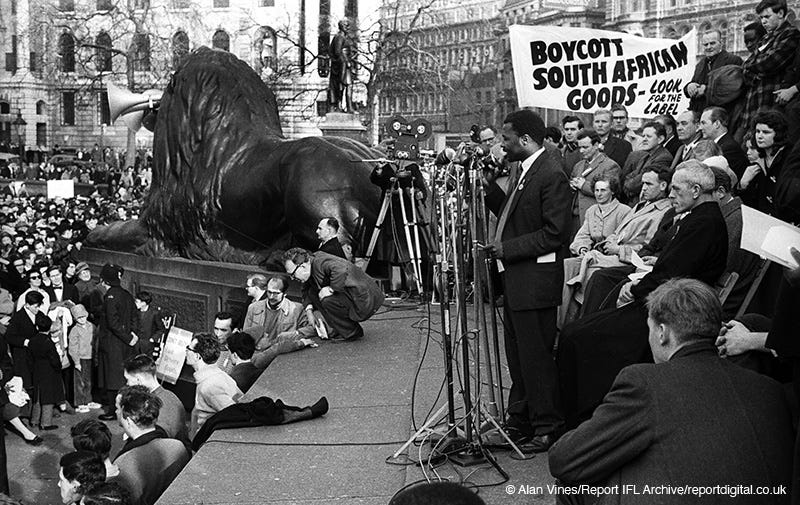Stories of cultural activism, then and now
From the fight against apartheid to the toppling of colonial statues and demands for reparations, the struggle isn't over.
Dear readers,
Sorry for posting twice in one week, but the world is in turmoil, and news is moving fast…
I’m just keen to add my little contributions.
Ten years ago, I came back from a war zone, from a country wrecked by colonialism, and most of the people I know in France didn’t want to hear about it.
To fight this indifference, I decided to focus on activism, and especially cultural activism.
I had so much hope then… I went back to England, and had a few wonderful months.
In the same way, when the pandemic stroke, I focus on possible positive change, activism from grassroots campaigners and from a few artists.
A few months later, I covered the protests denouncing the killing of George Floyd in the USA, while, in Bristol, in West England, and focused on answers to injustices, and thus learned so much on the issues of reparations.
Being based between England and France, the issue of reparations has been pushed forwards in the former then backwards in the latter… And I’m not always so hopeful.
Cultural activism these days is not very prominent in the western world. But grassroots activists are still doing an amazing job.
This week, I decided to speak again about the issue of reparations, in my podcast, produced for RFI.
Demands for reparations
PODCAST - SPOTLIGHT ON AFRICA
Global South amplifies calls for compensation for historical injustices
Issued on: 14/06/2024
This week we are addressing the issue of reparations for historical injustices, incl. slavery, colonial violence, war crimes, with a focus on the Caribbean and Africa...
With Nasim Salad from The Advocacy Team
These reparations could take various forms, primarily financial compensation.
Activists argue that former colonisers should compensate former colonies and that different perpetrators should provide reparations to various victims. This includes compensation for slavery and addressing losses and damages related to climate injustice.
In light of the recent European elections and the upcoming parliamentary elections in France and the UK, these questions could soon be reframed and gain prominence in public debate and international negotiations. Additionally, the African Union has designated reparations as a key issue for 2025.
To learn more about the feasibility and types of reparations being demanded, I spoke with Nasim Salad, a senior associate at The Advocacy Team, a public affairs consultancy.
The group has collaborated with think tanks like The One Campaign and Development Reimagined, and it has recently produced a report to suggest how to come up with concrete financial plans for potential reparations.
Nasim Salad has insight into the different forms of financial plans for reparations.
Spotlight on Africa is a podcast from Radio France Internationale.
By: Melissa Chemam
Listen from here: Global South amplifies calls for compensation for historical injustices
South Africa's cultural resistance
Meanwhile, as you know if you read the previous posts of this newsletter, I was lucky enough recently to travel to find inspiration from the other side of the world.
In Senegal then South Africa.
Apartheid ended 30 years ago in South Africa, in the spring of 1994, when the African National Congress led by Nelson Mandela was elected to govern the country.
And some of the people who had a major role in this fight were the cultural activists.
Thirty years on, I went to Johannesburg and met with the some of the activists that made this fight possible, including jazz legend Sipho Mabuse, in his house in Soweto.
How South Africa's music scene helped bring an end to segregation:
If you want to know more about Sipho, a special longer version:
Looking back at the music scene with Sipho 'Hotstix' Mabuse:
Listen to set designer, collage artist and painter Sam Nhlengethwa telling us how he met Nelson Mandela in 1994...
Do black lives, lives of people of ‘colour’, still matter?
As I wrote earlier, four years ago, I had so much hope these lives would finally matter to all.
The recent wars and their related crimes have however thought me a lesson…
After the protests denouncing the death of George Floyd in the USA, from Bristol, in West England, I wrote this piece:
With the toppling of Colston’s statue, British history was being made
I took part in this weekend’s Black Lives Matter march. When the slave trader’s statue finally fell, screams of joy exploded through the multicultural crowd
Melissa Chemam
in Bristol
Monday 08 June 2020
Bristol’s Black Lives Matter protests this Sunday concluded with the toppling of the public statue of a slave trader, Edward Colston, celebrated for decades by the city as a mere “philanthropist”. I was among the protesters gathered, and when the statue came down we felt our fight against the oppression of people of colour had finally hit a new, important level.
I came to Bristol in 2015 as a foreign journalist to write about the city’s culture and tradition of protests, based on the journey of its most famous artists. Once I started researching my book, I never stopped hearing about Colston. I chose to move back here again recently because I felt, as I explained to a friend earlier this year, that most of the problems of the 21st century started in England, and this is one place where we’re going to start to solve them.
The Bristol protests started, like so many others, as a response to the killing of George Floyd, with a few speeches on social justice and coming together to kneel, in silence, for eight minutes. Then the march started, peacefully, towards the centre of the city and the infamous statue of Colston. When the Black Lives Matter protesters finally pulled it down – at about 2.30pm, just an hour and a half after the march began – screams of joy exploded through the multicultural, multigenerational crowd.
What happened in Bristol showed that the debate on Britain’s colonial legacy has been postponed for far too long. If up until the 19th century it was considered politically correct to celebrate this sort of “philanthropy” based on slavery, change had been long overdue. Colston’s company alone is reported to have transported more than 100,000 slaves from west Africa to the Caribbean and the Americas between 1672 and 1689.
For me, as my own family has been deeply affected by colonialism elsewhere in the world, it is puzzling to hear some English people still defending the statue based on the understanding of our shared history.
I hope France wouldn’t erect statues of Petain, or Germany of Hitler, just for the sake of remembrance of our criminal pasts.
The fall of Colston’s statue in Bristol was a bellwether of attitudes – a sign that the UK will now have to deal with its past differently. British-Nigerian historian David Olusoga wrote that the statue might “be fished out at some point” and “put in the city museum, where it has long belonged”.
It was four years ago.
I thought then: “Change is upon us. History has been made in the UK. And it started in Bristol.”
But if it’s started to change… It’s certainly not changed for good…
Today, my hope is fading…
In 2014, ten years ago, I decided to report from Bristol, UK, to explore this idea of cultural activism more in depth, with a series or radio reports, articles and a book.
As much as I loved living there, I also learned a lot on the differences between words and deeds…
I’m happy this journey also took me to other places, even some where so much remains to do to fight the enduring echoes of colonialism - see more on Mayotte or New Caledonia, if you need), and to Dakar or Johannesburg, in Africa.
What feels amazing is to be among the global majority, away from the nauseous discourse of the fascist and racist far rights of the western world.
If you come through Paris before the end of June, or through Avignon in July, here is a show for you:
La France, Empire
Un secret de famille national
par Nicolas Lambert
Until 27/06/24 in Paris’ Theatre de Belleville:
https://www.theatredebelleville.com/fr/la-france-empire
In Avignon, Theatre 11:
https://www.festivaloffavignon.com/spectacles/4131-la-france-empire
“Nicolas Lambert debunks the preconceived ideas of our past, our colonial present. Personal memories and national romance collide. A facetious storyteller, he throws fuel on the fire with the desire to convey the complexity of the story, to track down the unsaid things that we carry together like cumbersome family secrets. And if laughter is never far away, the question remains: can we write a future on the rubble of a distorted past?”
Thanks for reading as usual.
Stay stay strong,
melissa
-
Melissa Chemam
Journalist & Writer
@ RFI English, New Arab, ART UK, Byline Times...
My blog: https://melissa-on-the-road.blogspot.com/
YouTube Channel: https://www.youtube.com/channel/UCXE4ofFjz0lsRzemjdmFf7w






